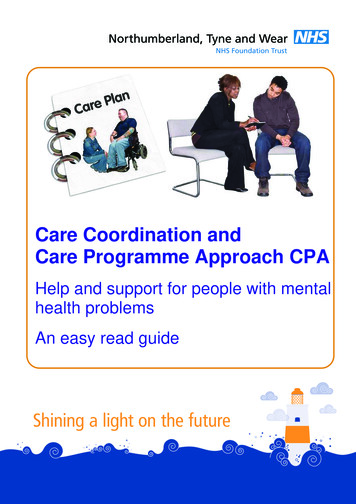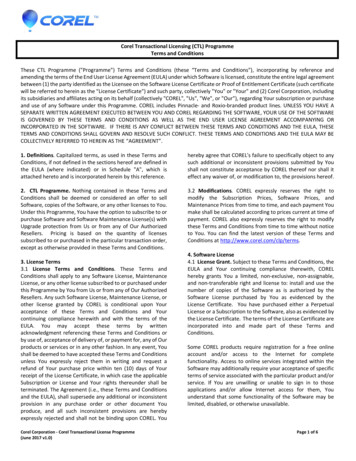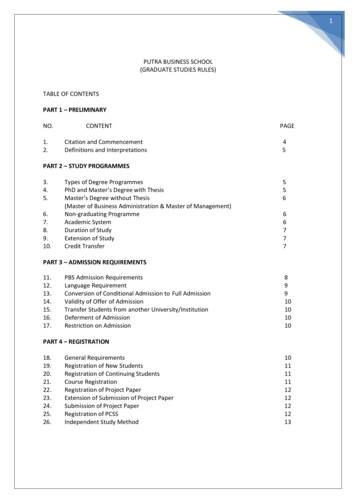
Transcription
Care Coordination andCare Programme Approach CPAHelp and support for people with mentalhealth problemsAn easy read guideShining a light on the future0
1
What is in this bookpage 3 What is care coordination?page 4 What is non CPA? What is care programme approach CPA? Assessment Planningpage 6 Reviewpage 7 Family and friendspage 8 How long can you get support for?page 9 Information about youpage 10 How to make a complaintpage 11 How to find out morepage 12 Other useful contact informationpage 13 What words meanpage 5Hard words in this book will look like this.There is a list of hard words and what they mean.2
A member of staff or a carer can support you to readthis booklet. They will be able to answer any questionsthat you have.What is care coordination?If you have mental health problems youmight feel very sad or angry. You mightneed support to help you live the life youwant.Care coordination is a way to plan yoursupport. It helps to make sure you get thesupport you need.Care coordination can help people whosupport you too. This could be your friends,family or other people who help you.There are 2 types of care coordination non CPA Care Programme Approach CPAThe type of care co-ordination you getdepends how much help and support youneed.3
What is non CPA?If you can do most of your own care youmight not need a lot of extra support fromother people. This means you have lowlevel needs.You will have a named person to help youwith your mental health problems. Thisperson is known as your lead professional.This support is sometimes called non CPA.What is care programme approach CPA?If you have complex needs you might needsupport with lots of different things.You will probably need support from lots ofdifferent people including professionals,family and friends. These people are knownas your care team.If you have complex needs like this we willuse the Care Programme Approach CPA tosupport you.You will have a named person to help planall the support you need.This person will be your care coordinator.4
AssessmentWe will talk to you to find out about thesupport you need.We will ask you questions about things thatare upsetting you or things that are difficult.For example we might ask you about whereyou live, your job, your friends and family.This will help us to know what we need todo to give you the best support.PlanningWe will write a care plan with you. We willwork with you to find out what support youneed.Your care plan tells the people who supportyou how to give you the support you need.Your care plan has contact information forall the people who support you.Your care plan also has a crisis plan.A crisis plan tells people what to do in an emergency what to do if you are unwell.5
ReviewWe will have a meeting to check your careplan at least once a year. We can check itmore often if you need.We will have a meeting with you and thepeople who support you. You can bringsomeone with you if you want like a carer orfriend.We will make sure you are still getting thesupport you need. We will find out if youneed different support.6
Family and friendsYour friends and family might give yousupport too.When you have meetings for assessment orcare planning you can talk about yourfamily. You can also talk about friends orother people who are important to you.If you want them to your friends and familycan help with planning your care. You canask them to come to meetings with you.If your friends and family give you a lot ofsupport they might be able to get thesethings A carers assessment to see whathelp they might need to support you. A written care plan about the supportthey can get. Information about what to do andwho to contact in an emergency.7
How long can you get support for?Everyone is different. Some people needsupport for a short time and other peopleneed support for longer.We want to make sure you get the rightsupport for as long as you need. We alsowant you to be able to cope well withoutsupport as soon as possible.When you can cope well yourcare coordinator will write to your GP.They will tell your GP what support youmight need from your GP.8
Information about youWe will keep information about you private.We will only tell people who need to know.This will help them to give you the bestsupport.You can ask to see the information we haveabout you. To find out more contactThe Disclosure TeamMHA/Records DepartmentSt Nicholas HospitalJubilee RoadGosforthNewcastle, NE3 3XT9
Problems, complaints or suggestionsIf you are unhappy about your support youshould tell your care coordinator or leadprofessional. They will help you to make acomplaint.Northumberland, Tyne and Wear NHSFoundation Trust has a complaints policy.We will give you a leaflet about how to makea complaint.If you think that we could improve ourservice then please let a nurse know youridea.Or you can call the Patient Advice andLiaison Service (PALS)South of Tyne0800 328 4397North of Tyne0800 032 020210
How to find out moreTo find out more about care co-ordinationand care programme approach CPA speakto a member of your healthcare team.For useful information about staying wellcontactNorthumberland, Tyne and Wear NHSFoundation Trust, Patient InformationCentrewww.ntw.nhs.uk/pic11
Other useful contact informationIndependent Mental Health Advocacy ServicesNewcastle, Gateshead, South TynesideYour Voice Counts - 0191 478 6472North TynesideIndependent Advocacy - 0191 259 6662NorthumberlandAdapt (North East) - 01434 600 599SunderlandTotal Voice Sunderland - 0191 510 505112
What words meancare coordinatorIf you have complex needs your carecoordinator will plan the support you get fromdifferent mental health professionals.complex needsThis is when you need help and support withlots of different things in your life. You mightneed support from different people.GPThis is the doctor you usually go to see if youare not feeling well.lead professionalIf you do not have complex needs your leadprofessional will plan your care. You might justneed support from the lead professional.low level needsThis means you do not need very much extrasupport to help you live your life.mental healthproblemsThis is when you find it hard to cope withthings in your life. You might get very angry orupset. You might need support to feel better.professionalThis is someone who is trained to help youwith your mental health problems.This could be a social worker, communitypsychiatric nurse (CPN), occupationaltherapist (OT), psychologist, therapist ordoctor.named personThis is the person you will talk to about thesupport you need. They will help to make sureyou get the right support. They will write yourcare plan with you.13
Thank youEasy words and design by Clearwww.clearforall.co.uk14
Further information about the content, reference sources orproduction of this leaflet can be obtained from the PatientInformation Centre.This information can be made available in a range of formats onrequest (eg Braille, audio, larger print, BSL or other languages).Please contact the Patient Information Centre Tel: 0191 223 2545Published by the Patient Information Centre2016 Copyright, Northumberland, Tyne and Wear NHSFoundation TrustRef, PIC/675/0516 May 2016 V3www.ntw.nhs.uk/picTel: 0191 223 2545Review date 2019Follow us@ntwnhswww.facebook.com/NTWNHS15Review date 2016
0 Care Coordination and Care Programme Approach CPA Help and support for people with mental health problems An easy read guide Shining a light on the future










